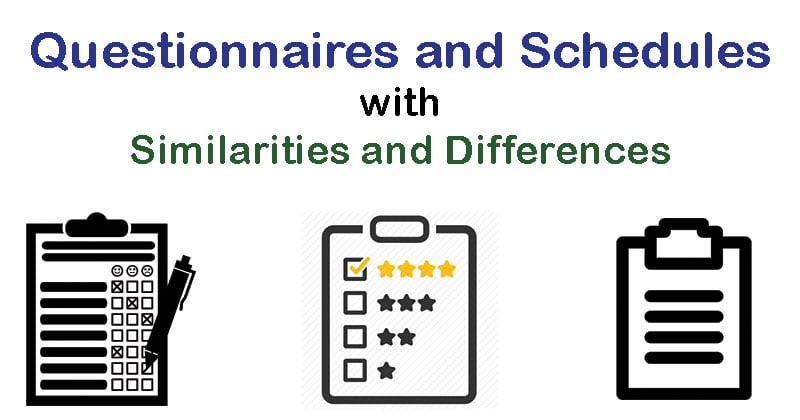- The research process is incomplete without the collection of data, which starts after the identification of the research problems and chalking out research design.
- There are several methods involved in the collection of primary data, like observation, interviews, questionnaires, schedules, etc.
- Both questionnaire and schedule are popularly used methods of collecting data in research surveys.
- There is much resemblance in the nature of these two methods and this fact has made many people to remark that from a practical point of view, the two methods can be taken to be the same.
- But from the technical point of view, there are many differences between the two common methods of data collection.

Similarities between Questionnaires and Schedules
- Both are set of related items having questions relating to a central problem.
- Both use mainly structured questions and these questions are so phased and interlocked that they have a built-in mechanism for testing the reliability and validity of the response.
- In both the same set of questions is administered to all the respondents and comparable results are obtained.
- Both these instruments have to be used with the same general principles of designs and have to take into account the same problems and basic difficulties they have to be limited in lend.
- In both, the central problem has to be concentrated upon the following considerations involved in the problem of evolving the questionnaire and a schedule as a unit.
- Drawing the responding into a situation through awake and interest.
- Proceeding from simple to complex questions.
- No early and sudden request for information of a personal and embracing intimate nature.
- Not asking embarrassing questions without giving the respondent an opportunity to explain himself.
- Moving smoothly from one item to another.
- In both certain types of questions have to be eliminated such as vague and ambiguous questions, emotionally changed questions, loaded and leading questions, questions eliciting no response and questions having a structured response to the queries, violence to the existing facts.
- In both pilot studies and pre-tests are necessary for formulating the instrument and for bringing them to the final form. They have to go through the same stages of development.
Differences between Questionnaires and Schedules
- The questionnaire refers to a technique of data collection which consists of a series of written questions along with alternative answers.
- The schedule is a formalized set of questions, statements, and spaces for answers, provided to the enumerators who ask questions to the respondents and note down the answers.
- While a questionnaire is filled by the informants themselves, enumerators fill the schedule on behalf of the respondent.
| Character | Questionnaire | Schedule |
| Delivered by | In general, questionnaires are delivered to the persons concerned either by post or mail, requesting them to answer the questions and return it. | Enumerators go to the informants with the schedule. |
| Role of Respondents | Read and understand the questions and reply in the space provided in the questionnaire itself. | Only answer the questions asked by enumerators. Sometimes, the schedule is distributed to the respondents, and the enumerators assist them in answering the questions. |
| Filled by | Respondents | Enumerators |
| Response Rate | Low | High |
| Coverage | Large | Comparatively small |
| Cost | Economical | Expensive |
| Respondent’s identity | Not known | Known |
| Observation Method | Not applicable | Applicable |
| Important features required | · Simple to understand
· Short questions · Interesting and Engaging |
No special features required |
| Success relies on | Quality of the questionnaire | Honesty and competence of the enumerator. |
| Usage | Only when the people are literate and cooperative. | Used on both literate and illiterate people. |
References
- Kumar, Ranjit. Research Methodology: A Step-by-Step Guide for Beginners. Los Angeles: SAGE, 2011. Print.
- https://keydifferences.com/difference-between-questionnaire-and-schedule.html
- https://www.wisdomjobs.com/e-university/research-methodology-tutorial-355/difference-between-questionnaires-and-schedules-11492.html
- https://owlcation.com/social-sciences/Schedule-and-Questionnaire-in-Research-Methodology
- https://owlcation.com/social-sciences/Schedule-and-Questionnaire-in-Research-Methodology
- https://www.advancedwriters.com/write-my-research-paper.html
